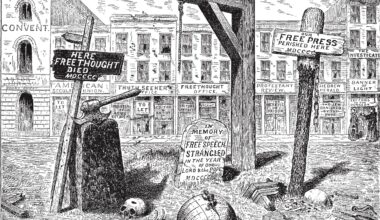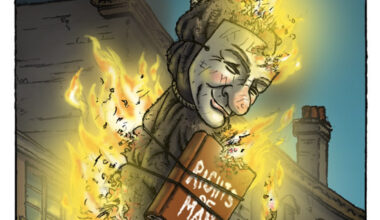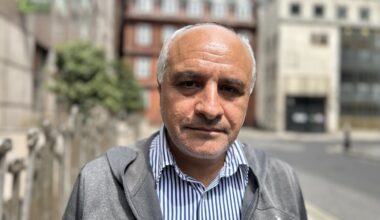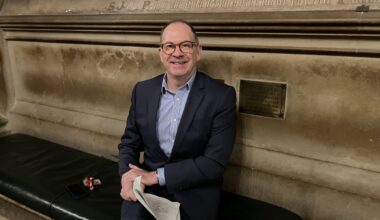
Tanja Nijmeijer fought at a young age with the FARC, the ‘Revolutionary Armed Forces of Colombia’, a Marxist-Leninist guerrilla group which has waged war on the Colombian government from the jungle for 60 years. She was involved in acts of violence. Does this make her a terrorist? A 2023 documentary about her life mainly highlights her idealistic side but does show both sides of the coin.
Tanja Nijmeijer has been called both a revolutionary (by herself) and a terrorist (by others) and is on Interpol’s most-wanted list. The documentary Tanja—Dagboek van een guerrillera (Tanja—Diary of a guerrilla), directed by Marcel Mettelsiefen, gives us Tanja’s life in a nutshell: she describes how she became involved with the FARC and how her thinking has developed over the years. Her mother, who received no signs of life from her daughter for years and had to get all her information from the media, also gives her side.
Tanja was born in 1978 and spent her childhood in the far north of the Netherlands. In 1998, she visited Colombia as a student in training to become an English teacher. She became involved in the conflict between the established order and the FARC, which she joined in 2002.
When the Colombian state began to waver under the ongoing violence, the US military entered the conflict. Tanja worked her way up in the FARC and became a significant player. She was romantically involved with one of the FARC leader’s nephews until 2010 and, from 2012, she even took a prominent role in the peace negotiations which led to an agreement between the FARC and the government in 2016.
In the documentary, she denies that she can be equated with a terrorist. She says she fought in a revolutionary war with a clearly defined goal, which she claims is very different from the type of attacks by, for example, al-Qaeda. She is asked questions about the tension between ‘acts of war’ and ‘terrorism’. But this distinction gradually becomes blurred by the facts presented in the film, even as the film increasingly portrays Tanja herself as a rebellious peacemaker and great reconcile.

The documentary leaves open the question of whether Tanja’s actions actually killed people. Tanja is accused of taking part in the kidnapping of three American citizens and she was involved in the bombing of a passenger bus which resulted in no casualties. But, as the documentary states, tragic deaths could just as well have occurred in this type of attack. And how exactly did this bombing contribute to military objectives? The film argues that the FARC wanted to target those at the heart of business and government and thus targeted the environments frequented by such people. But can one describe these as legitimate military targets? Was the FARC truly less terroristic than other terrorist groups?
Tanja describes in her diaries that she saw the flaws of the movement very clearly—corruption, sexism, favouritism, and financial reliance on drug production and distribution. She also mentions that the ultimate goal, the foundation of a new kind of society based on equality, camaraderie, and communality, gradually vanished behind the horizon. Nevertheless, she remains loyal to the movement, even after Colombian media translated and published parts of her critical diary in 2007.
‘How do you deal with this?’ the interviewer asks her. ‘Are you nostalgic when you think about your family?’
‘It was a great sacrifice’, Tanja says, looking bright-eyed into the camera, fierce and confident, wearing an army cap, with an automatic weapon gleaming against her shoulder. ‘But if I had chosen to be with my family, I couldn’t have been here. It’s one or the other. This is the route I chose. I am convinced that this sacrifice must be made.’
‘The guerrilla [movement] is your family?’ the interviewer asks. ‘Yes, of course’, Tanja replies with a smile. ‘The guerrilla [movement] is even much more than that. I have this to say to the world: I am a guerrilla fighter for the Revolutionary Armed Forces of Colombia, and a guerrilla I will remain until we win or until I die.’
It is clear why the FARC did not execute Tanja after her critical diary fragments fell into enemy hands. She is very mediagenic. Her eyes shine and she speaks with a disarming charm; she is obviously ready to fight and die for what she believes in. Energy, fanaticism, and drive emanate from her. The documentary relies heavily on this, and it seems to choose Tanja’s side. With her recurring ‘You know…?’, the viewer is made to feel like a confidant: You know this situation—you understand what I am talking about.
In this way, the documentary stands up for Tanja. Is that just? I had to let the film sink in for a long time.
I cannot deny being intrigued by the ‘abysmal’ (my word; see below) choice she made. She has shown herself able to let go of all her certainties and to fight for her ideals without restraint. In my 2022 book Wees Afgrondelijk (Be Abyssal), I describe the kind of inner transformation that this requires: a leap of faith associated with a willingness to burn bridges behind you. At the macro level of geopolitics and ideology, the birth of any worldview comes from just such a leap.
Her Marxist-Leninist guerrilla warfare was more important to this young lady, who literally had her whole future ahead of her, than her family. Tanja could have died at any moment, blown up by bombs dropped from American planes or as a result of one of the many dangers of the jungle. These risks are intertwined with the destiny she chose to follow, and she seemed to accept them completely—she was truly willing to die for the cause.
However, as Nietzsche prophesied, bourgeois-capitalist existence is too boring and too flat for a truly heroic soul… Tanja Nijmeijer, preeminently Nietzschean, made the choice to dedicate her life to a revolutionary mission and to subordinate her individual identity to a collective war effort.
In choosing this path, she consciously opted to reject the bourgeois existence that loomed in the 1990s. When the Berlin Wall came down and the Soviet Union dissolved itself, the monomaniacal fear of communism and nuclear war gave way to a wider range of uneasy projections of the future. Liberal democracy became hegemonic: there were no longer any existential challenges or serious alternatives to it. And the highest virtue of liberal democracy was that it was easy; it offered comfort and material prosperity.
However, as Nietzsche prophesied, bourgeois-capitalist existence is too boring and too flat for a truly heroic soul. It would not do justice to the human appetite for intense passions, perilous adventures, and absolute justice. Tanja Nijmeijer, preeminently Nietzschean, made the choice to dedicate her life to a revolutionary mission and to subordinate her individual identity to a collective war effort.
If you grew up in Colombia, such a choice would perhaps be understandable. Suppose you were born in such a country. The government is corrupt and cares little about the people born into poverty. Any politician who does not allow himself to be bribed and does not collude with the existing networks of power is destroyed by smear campaigns in the mass media.
In this situation, you try to climb up through hard work, but criminals and corrupt officials make this impossible. Inflation makes building a decent life an even more unlikely prospect, and all the rules serve only to strengthen the position of the people who already have money and power. What tangible option does one have in this situation other than to try and effect change through revolution? The last glimmer of hope lies in armed uprising. But Tanja herself came from a rich country with a family that loved her: she involved herself in a conflict that had very little to do with her. This was an extraordinary choice.
Every revolution starts with good intentions but ends with new elites replacing the old ones. Even in the so-called egalitarian communes of the 1960s and 1970s—in which even sex partners were shared—the male leadership figures had more access to the women. Any levelling in the name of equality requires a distribution mechanism, and therefore authority, and therefore inequality in power. And even if property is divided equally, jealousy remains—it is just shifted to personal qualities such as beauty, intelligence, musical talent, or whatever else.
Every revolutionary order…takes on the shape of the old order that it deposed.
Organised violence of any kind requires hierarchy, and these hierarchies persist after the original aims of the violence have been achieved or have fallen away. Dissident voices must be suppressed in order to keep spirits high and to ensure an atmosphere of solidarity. Those who have fought and suffered in battle then think that they are more entitled than others to the fruits of victory. Every revolutionary order thus takes on the shape of the old order that it deposed.
It is not without reason that Tanja’s descriptions of the internal corruption within the FARC are reminiscent of Orwell’s Animal Farm. In that story, the oppressive farmers who were driven out and the pigs who took their positions of power became, in the end, indistinguishable.
Ultimately, however, Tanja does not go all the way. Although she says halfway through the film that she will either triumph as a revolutionary or go down fighting, things turn out differently. She begins to see that the balance has turned. The Colombian government has grown stronger, backed by the US, and the FARC’s attacks and its business model—based on kidnappings and drug money—have turned popular opinion against them. Although the FARC cannot be completely destroyed—it is still difficult to wipe out a guerrilla army in a jungle—the battle is no longer winnable for them either. Tanja decides that a compromise must be made, and peace must be sought.
The hardened jungle warrior transforms into a figure of reconciliation, gets an international platform, and everything seems to improve. This about-face doesn’t seem to cost her much. She remains as mediagenic as ever, blazing with militancy as well as charm. Was giving up her ideals a bitter pill to swallow? In the end, the status quo wins, but we get little idea of how this affected Tanja psychologically.
As a viewer, you are left with mixed feelings. Tanja Nijmeijer is a fascinating person, a beautiful woman, passionate and eloquent as well as temperamental. The film colludes with her in portraying the case for her as sympathetic while downplaying the case against her—or at least she herself manages to do so when she gives an account of her choices. The viewer feels inclined to forgive her for almost anything. But how deserved is such forgiveness? After all, the FARC killed many innocent people and was responsible for a great deal of human misery.
The questions raised by Tanja Nijmeijer’s life and choices are perennial, and maybe even unanswerable. A final thought: perhaps the documentary not only offers a portrait of the past but also hints at a possible future. Given the current state of affairs, might we see revolutions breaking out in the streets of Europe itself once again? The disappearance of the middle class under the pressures of globalisation and immigration, the ever-growing gap between the established order and the ‘populists’/‘nationalists’, vast inequalities across the continent not only in wealth but also in social mobility… With people like Tanja Nijmeijer among us, and with the ineradicable human impulses she represents, revolution certainly cannot be ruled out.








Your email address will not be published. Comments are subject to our Community Guidelines. Required fields are marked *
Donate